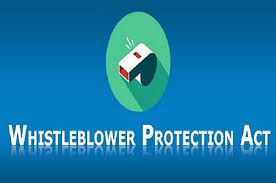Media Rights Agenda (MRA) has called on the Federal Government to take urgent and concrete steps to strengthen legal and institutional protections for whistleblowers in recognition of their critical role in exposing corruption, human rights abuses and other wrongdoing, describing them as a cornerstone of transparency, accountability, and good governance.
According to a statement issued on Monday in Lagos ,MRA stressed that whistleblowers serve the public interest by courageously disclosing information that would otherwise remain hidden, often at great personal risk, noting that in Nigeria, they continue to operate in a climate of fear, retaliation, and legal uncertainty, which deters many others from coming forward with information about wrongdoing.
The theme of the 2025 World Whistleblowers’ Day is “Protecting the Truth-Tellers”, and the Day focuses on raising awareness about whistleblowing, combating corruption, and encouraging a positive culture of speaking up within organisations. This year’s campaign, “we’re all ears,” seeks to highlight the importance of whistleblowing and support those who speak up against wrongdoing.
Ms Ayomide Eweje, a Programme Officer at MRA, said in a statement: “We note that the current whistleblower protection framework in Nigeria remains weak, fragmented, and largely ineffective. The Federal Government continues to threaten whistleblowers with prosecution despite the whistleblower protection provisions in Section 27(2) of the Freedom of Information Act. Besides, the Whistleblower Policy adopted by the Government in 2016 was not designed to provide protection for persons who risk everything to expose corruption, misconduct, human rights violations, threat to public safety, or other wrongdoing, but is merely aimed at assisting the government to recover looted public.
In her words , she said ,the absence of a comprehensive legal framework for the protection of whistleblowers has left them vulnerable to threats, harassment, job losses, and physical harm, adding that successive governments in Nigeria have failed to acknowledge the immense value that whistleblower bring to the society and the important role that they play in combating corruption, and ensuring transparency.
Ms Eweje argued that whistleblowers are often motivated by a patriotic duty and a commitment to the greater good, noting that “whistleblowers are the eyes and ears of our society; they step forward so that the rest of us can see and act. When whistleblowers speak up, everyone benefits; public funds are better managed, there is more efficient delivery of public services, trust in institutions grows, and we have better governance. Yet without reliable channels to report wrongdoing, we risk enabling critical information about wrongdoing to stay hidden
She lamented that despite the essential role that such courageous individuals play in ensuring that powerful actors in the society are held accountable, they continue to face harassment and intimidation, legal hurdles, retaliation instead of protection, sometimes paying for their selfless acts with their lives or liberty.
Ms Eweje therefore urged the National Assembly to prioritise the passage of a robust whistleblower protection legislation that guarantees confidentiality in reporting in appropriate cases, shields whistleblowers from reprisals, and establishes secure reporting channels while also establishing an independent whistleblower protection agency with the mandate to investigate reprisals, support whistleblowers, and enforce sanctions against those who retaliate against them.















